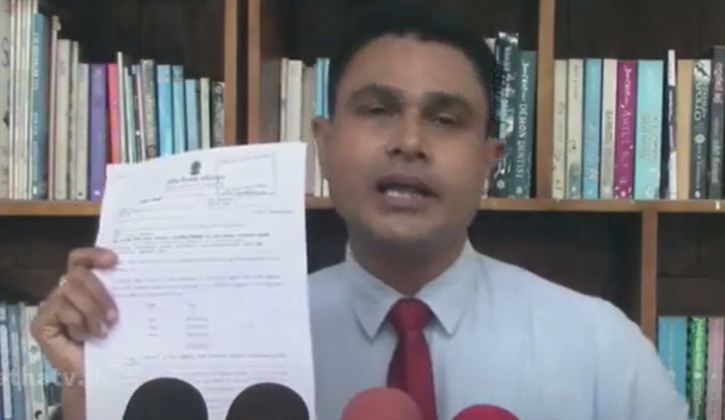-By LeN Special Health Correspondent

(Lanka-e-News -13.July.2025, 11.30 PM) In what could become the most staggering corruption scandal in Sri Lanka’s public healthcare system in recent memory, over Rs. 2.5 billion worth of questionable chemical reagent purchases—some expired, others dangerously close to expiration—have been uncovered at the National Hospital’s central laboratory in Colombo.
Dr Chamal Sanjeewa, Chairman of the Union of Doctors for Civil and Medical Rights, has publicly declared that the scale and implications of this procurement scheme far exceed the widely condemned dealings of former Health Minister Keheliya Rambukwella. “This is corruption of a magnitude ten to fifteen times greater,” he stated bluntly at a press conference earlier this week.
The shocking revelations stem from a June audit report released by the Government Audit Department, now raising urgent questions about institutional negligence, administrative complicity, and the potential loss of lives due to false laboratory results.
According to the report, over the last three years, chemical reagents—used in blood work, diagnostic panels, and various laboratory tests—were procured regionally without the proper approval of the hospital’s Medical Supplies Division (MSD), amounting to Rs. 2.5 billion in unauthorised transactions.
More troubling still, nearly Rs. 13 million worth of these chemicals were already expired at the time of purchase. A further Rs. 5 million worth had expired by the time they were delivered. Another Rs. 8 million worth had less than a month’s validity remaining when received by the lab—rendering them virtually useless for long-term use.
"This is not procurement error. This is deliberate, systemic, and high-level fraud,” Dr Sanjeewa told The Times. “People need to understand—these aren't expired vitamins. These are diagnostic chemicals used to guide treatment for cancer, heart attacks, and kidney failure. Using expired reagents means thousands may have been misdiagnosed. This scandal could have cost more lives than COVID-19.”
Much of the mystery centres around the bureaucratic fog that permitted this to happen. The purchases were made outside centralised regulatory channels, with no sign-off from the authorised units within the Medical Supplies Division. Nor were they cleared through the appropriate tendering procedures or subjected to technical evaluation panels.
The expired reagents were procured at high prices—often close to full market value—suggesting that the objective was not cost-saving but profit maximisation for certain suppliers and possibly those within the hospital system who facilitated the orders.
Dr Sanjeewa has posed the most urgent and pointed questions:
"Who authorised these procurements? Who was on the so-called technical committee? Who accepted delivery? Who verified these expired or near-expiry goods and signed off on them? And who recommended these suppliers? These are not small-time fraudsters—this is institutional corruption."
The Criminal Investigation Department (CID) has now been formally requested to launch a full probe into the scandal, and investigators are said to be considering whether elements of criminal conspiracy, misappropriation of public funds, and wilful endangerment of life are involved.
Beyond the chemical reagents, the laboratory itself is reportedly stocked with outdated diagnostic equipment—machines that have been phased out in other countries due to reliability concerns. Many of these instruments, auditors say, were purchased at inflated costs under dubious justifications.
“These aren’t just old machines—they're obsolete,” said a former laboratory technician at the hospital. “They don’t calibrate correctly. They produce inconsistent results. Yet they’re being used every day on thousands of patients.”
The consequences are not theoretical. Every test result issued using these expired or substandard reagents is now subject to suspicion.
“If a patient with a cardiac issue received a report stating there’s no heart abnormality, or someone with kidney failure was told they were fine—those are not errors. Those are potential death sentences,” Dr Sanjeewa warned. “And it’s happening at our premier national hospital, not a rural dispensary.”
Several tragic cases have already come to light: a 49-year-old woman reportedly discharged following a clean blood panel later collapsed at home due to undiagnosed kidney failure. Another man, whose ECG appeared normal on paper, suffered a fatal heart attack days later.
These cases are only now being traced back to potentially faulty lab reports issued using expired chemical stock.
The revelations have triggered a firestorm in Parliament. Health Minister Ramesh Pathirana has come under pressure to initiate an internal review, while opposition lawmakers are calling for a full-blown Commission of Inquiry.
“This is not just negligence—it’s genocide by spreadsheet,” one MP thundered during a late-night session on Friday. “People trusted this hospital. And now they are paying for that trust with their lives.”
Despite the gravity of the issue, the Ministry of Health has yet to issue a full public statement. Insiders say political considerations and institutional paralysis may be delaying action.
Some suspect the scandal’s reach extends beyond administrators to the corporate suppliers and possibly even into political circles, suggesting the need for the Commission to have full prosecutorial powers and international forensic auditors.
This isn’t the first time Sri Lanka’s public healthcare system has been embroiled in scandal. In 2023, then-Health Minister Keheliya Rambukwella faced blistering criticism for unauthorised vaccine purchases, emergency drug tenders, and procurement irregularities. That saga, too, was exposed by whistleblowers, only to disappear into a fog of bureaucratic delays.
“This is worse,” Dr Sanjeewa said. “This is happening after that. The system didn’t just fail to reform—it doubled down.”
For now, all eyes are on the CID and its ability to mount a truly independent investigation. The public wants names, resignations, and—most critically—justice.
“If we cannot protect even the National Hospital from corruption, what hope is there for rural clinics or provincial hospitals?” asked Dr Sanjeewa. “This isn’t just about chemicals or expired goods. It’s about whether we as a country value human life or political loyalty more.”
Until those responsible are held to account, the question will remain: how many Sri Lankans will die from not just illness, but from the corruption infecting the very institutions meant to save them?
-By LeN Special Health Correspondent
Watch the Video
---------------------------
by (2025-07-13 19:17:04)
Leave a Reply